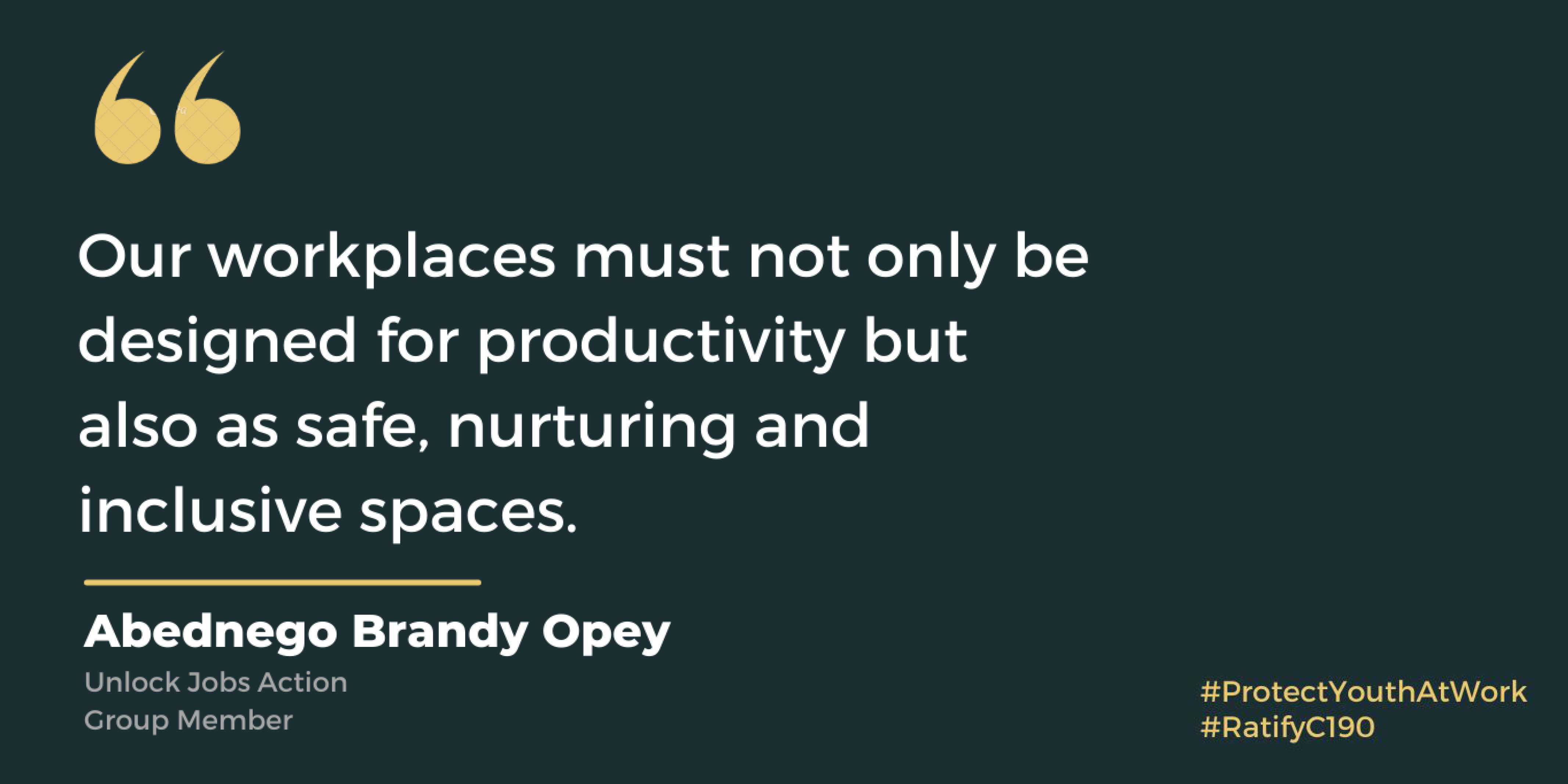By Opey Abednego Brandy, Unlock Jobs Action Group Member, Programme Manager / Founder
For most of us, the workplace forms a key feature of our lives. Generally, it is estimated that we spend one-third of our lives at work. If we are going to spend so much precious time at work, our workplaces must not only be designed for productivity but also as safe, nurturing and inclusive spaces. Inclusive workplaces rarely form organically – instead, they are the result of strong legal frameworks ensuring the rights of workers when they face barriers like harassment or violence.
Young people are an integral part of the workforce, and providing them with an inclusive work environment is essential. Globally, 46% of the world’s population is below 24 years, with the median age in Africa being 19. Although young people form a significant share of the world’s demography, they face steep challenges that prevent their effective participation at work, which limits their ability to achieve their potential. In one survey, 45% of young people were financially insecure and concerned about the stability of their employment. Also, young people are two times more likely to be working poor than adults; hence, the urgent call for inclusion targeted at protecting young people at work.
To deliver inclusion for young people and to protect their interests at work, we must take the following three key steps: Creating a Safe and Supportive Work Environment, Providing Mentoring and Professional Development Opportunities, and Addressing Unconscious Bias and Stereotyping.
Creating a Safe and Supportive Work Environment
To deliver inclusion for young people at work and to harness the full potential of young people entering the workforce, it is essential to have safe and supportive workplaces. This involves shaping the company culture to enable young people to share their ideas, opinions and misgivings without fear of reprisal, sabotage and discrimination. Additionally, it consists in developing and enforcing regulations concerning harassment and unfair labour practices that stop young people from bringing their full selves to work. Governments should ratify the International Labour Organisation’s Convention 190 (C190) to make this a seamless process. Adopted in 2019, C190 is the first international labour standard that recognises everyone’s right to a workplace devoid of harassment and violence in all its forms. By ratifying C190, governments show zero tolerance for workplace abuse and a strong commitment to inclusion for everyone at work.
Providing Mentoring and Professional Development Opportunities
For many young people, internships are their point of entry into the workforce. However, internships are mostly unpaid, underfunded, and given little attention by employers. It is preposterous that over 43% of internships today by for-profit companies in the US are unpaid. It is even more concerning that paid internships are a far rarer exception in most other countries.
For the few employers with rigorous and satisfactorily designed entry-level programmes, the competition for these few spots is so high that many qualified young people are not accepted and fall through the cracks . More companies should invest in their entry-level programmes and structure their internships to deliver upskilling for young people and to enable them to enter the workforce seamlessly. Continuously providing these opportunities prepares young people to take their proper place in the workforce and not be left behind.
Addressing Unconscious Bias and Stereotyping
Young people are incorrectly perceived as inexperienced and not critical to the success of the workplace. This perception encourages reverse ageism and unfair practices and demeans the creativity, vibrancy, and innovativeness young people bring wherever they work. While this primarily reflects the wider society and its perception of its young people, it has no place in the world of work as it creates a cycle of the young being perpetually perceived as unessential. Young people should not be hired and onboarded as an inexpensive workforce but should be fairly compensated for the innovative ideas they deliver to companies.
In conclusion, young people are essential to the success of the workforce and need all the support they can get. This can be achieved by creating a genuinely inclusive workplace backed by governments ratifying ILO C190, providing outcome-focused entry-level programmes, and rethinking how we view young people and their abilities.

By Opey Abednego Brandy
Unlock Jobs Action Group Member, Programme Manager / Founder



